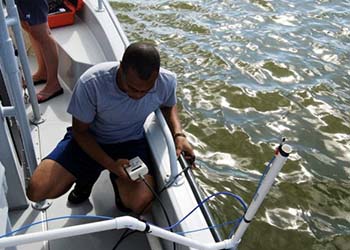Improve our Planet: How to Become an Environmental Scientist

Huston-Tillotson University Students
Environmental science isn’t just about tree species and rock formations. As humans grow more aware of how the environment affects our societies and, conversely, how we affect the environment, scientists find that the environment plays a critical role in shaping human life.
One of the foremost pioneers of environmental science as we know it today is Robert D. Bullard, an HBCU grad. Bullard is revered for his campaign against environmental racism—which largely focuses on how environmentally-driven practices and policies affect those living in poorer urban areas—and has earned himself the moniker, “the father of environmental justice.”
In such a rapidly changing field, there’s plenty of room for new faces with new ideas—and you may be one of them. Becoming an environmental scientist isn’t an impractical idea, either. STEM careers, in general, are in high demand and often come with a good salary. Plus, you’ll be a role model in an industry that has historically undervalued the contributions of Black or Brown scientists.
How to Get Started

Bethune-Cookman University
You may not be making any groundbreaking discoveries quite yet, but it’s not too early to start setting yourself up for success. While in high school, it’s a great idea to take advanced math and science classes. AP biology, AP chemistry, and, of course, AP environmental science will be especially helpful in preparing you for college-level work.
In your free time, seek out extracurricular opportunities that focus on your specific areas of interest, such as an environmentalism club. As you get more involved, you’ll be able to start narrowing down where your specific interests lie within the field. Focused studies within the field abound—you could find your niche in archeology, ecology, meteorology, zoology and climatology, among others.
Whatever their interest, students who plan to pursue careers in environmental science will need to enroll in a degree program. Majors in this field include a wide range of related course subjects, which may include:
- Geographic information systems
- Chemistry
- Biology
- Mathematics
- Statistics
- Physics
- Botany
- Atmospheric and ocean sciences
- Chemical engineering
- Environmental engineering
- Space sciences
Careers in Environmental Sciences
Graduates in this field may pursue career paths in a wide variety of capacities. Some possible roles include:
- Agricultural scientist
- Environmental consultant
- Air pollution analyst
- Natural resource manager
- Recycling officer
- Environmental educator
- Nature conservation officer
- Environmental engineer
- Meteorologist
- Zoologist
Want to learn more about this possible career path and college major? Have questions about which UNCF colleges and universities offer degrees in environmental science? Looking for help with financing this degree?
Click Here So We Can Help You!

How to Prepare for Success
In order to be successful, students in environmental science should be great at science and math, be out-of-the-box problem solvers, and have a passion for protecting natural resources. If you’re fascinated not only by natural systems but also by their social impact, you’ll never run out of new ideas to explore and investigate. To help you fund your education, check out The Fund II Foundation UNCF STEM Scholars Program and other STEM scholarships.
Schools to Consider
Once college is on the horizon, it would be a smart idea to seek out a university that is equipped to give you a high-quality education that will prepare you for a successful career. To enter the field of environmental science, students must earn a minimum of a bachelor’s degree—and preferably graduate degrees—in this field. These UNCF-member schools offer programs in environmental science:
- Spelman College
- Tuskegee University
- Claflin University
- Florida Memorial University
- Bethune-Cookman University
- Huston-Tillotson University
- Benedict College
- Paine College
- Miles College
Professional Organizations
There are also many environmental science organizations that can provide more insight into some of the specializations in this discipline. Just a few of them include:
- Air and Waste Management Association (A&WMA)
- Association of Climate Change Officers (ACCO)
- Association of Environmental and Resource Economists (AERE)
- Environmental Design Research Association (EDRA)
- Environmental Information Association (EIA)
- National Association of Environmental Professionals (NAEP)

Scholarships Available
There’s no better way to start on your path toward a successful career in environmental science than with a solid financial foundation. Fortunately, many scholarships are available through UNCF, including some specifically for environmental science majors. Keep an eye on the UNCF website for current scholarship opportunities and announcements.
Search for specific scholarships and view those that are currently accepting applications here! Students should also check with each college or university to see if there are additional scholarships available to study environmental science.
As you explore your options, be sure to use our guide to applying for scholarships and grants. You can also receive guidance by submitting a major interest form if you are interested in a career in environmental science. Submit the form on our website to get started. And follow us on UNCF social media channels to receive notifications about our scholarships and member HBCUs. Reach out today!